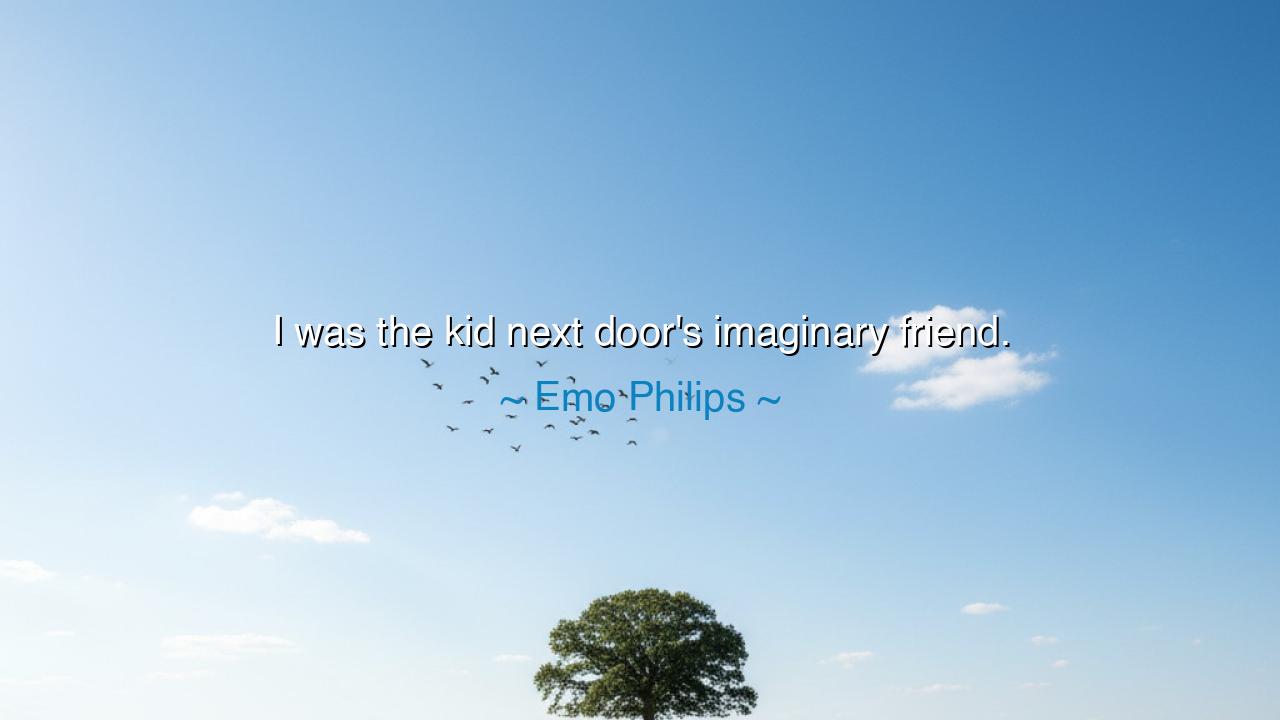
I was the kid next door's imaginary friend.






In the quiet strangeness of human imagination, where loneliness and wonder dwell side by side, the philosopher of absurdity and tenderness, Emo Philips, once declared: “I was the kid next door’s imaginary friend.” To those who hear it quickly, it sounds like a jest — a whimsical absurdity, a surreal image born of comedy’s playfulness. Yet to those who listen more deeply, it reveals a haunting beauty. Beneath its laughter lies a truth both gentle and profound: that there are souls who live at the edge of belonging, who dwell between the real and the imagined, unseen yet deeply yearning to be known.
The origin of this line lies in the heart of Emo Philips’ craft — the art of the outsider. With his fragile voice, his eccentric delivery, and his tragicomic insights, he gave shape to the feeling of alienation that so many carry silently. His joke is not merely self-deprecating humor; it is a portrait of the human spirit in its most vulnerable form. To say he was “the kid next door’s imaginary friend” is to confess, through laughter, a deep truth about invisibility — about being present in the world, yet unseen by it. It is the voice of one who lives between the lines of other people’s stories, who is real enough to feel but too different to be fully accepted.
In this paradox lies the ancient wisdom of the outsider, the one whom society overlooks yet secretly needs. For throughout history, those who seemed invisible have often been the ones who saw the clearest. The prophets, the poets, the jesters — all were dismissed by the world as strange, yet their words reshaped civilizations. Consider the tale of Vincent van Gogh, who lived his life unseen, his brilliance unrecognized, his art dismissed as madness. In his time, he was the “imaginary friend” of the world — a presence not yet believed in. And yet, after his passing, his vision illuminated the hearts of millions. What was once invisible became eternal. Thus, Emo’s jest conceals the same divine paradox: that what the world refuses to see may, in time, become its most enduring light.
But there is another layer — one of compassion. To be the “imaginary friend” of another’s imagination is to exist in empathy’s purest form. It is to live for connection, even in absence. The child’s imaginary friend exists not for itself, but for the child — to comfort, to accompany, to listen. So too, many among us serve as unseen companions to others’ pain: the quiet friend who listens, the stranger who smiles, the soul who holds space for another’s dreams without ever being acknowledged. In this way, Philips’ line becomes a hymn for all who love silently — those who offer kindness that may never be named, and yet remains real.
And yet, there is sorrow here, too — the sorrow of the unseen self. Every human being longs to be known, to have their presence recognized. When Philips says he was “the kid next door’s imaginary friend,” he touches upon the ache of being real in one’s own heart, but unreal in the eyes of others. It is the loneliness of the artist, the thinker, the dreamer — those who live in the imagination of the world, but rarely in its embrace. This ache is not weakness; it is the price of sensitivity. For the one who feels deeply often sees beyond the horizon of common sight, and in that seeing, becomes misunderstood.
Yet there is redemption even in this loneliness. The imaginary friend exists not because it is needed to be believed, but because it chooses to believe in others. Likewise, those who live unseen still give meaning to the world through their presence, even if the world never notices. The quiet worker, the gentle parent, the unrecognized artist — all move through life like invisible friends, holding up the fabric of the real through unseen love and faith. Emo’s line, though comic, reminds us that invisibility is not erasure. What is unseen may yet hold the deepest power, for its value does not depend on acknowledgment, but on authenticity.
Therefore, O listener, take this teaching to heart. If you have ever felt invisible, remember that your existence carries meaning even when unnoticed. Do not measure your worth by who sees you, but by what you see. To live unseen yet to love deeply, to give freely, to dream boldly — this is the nobility of the soul. Be, if you must, the “imaginary friend” of a world that has forgotten how to imagine. Bring kindness to the indifferent, beauty to the dull, truth to the blind. For in time, the unseen becomes unforgettable.
So laugh with Emo Philips, but let the laughter carry its wisdom. “I was the kid next door’s imaginary friend.” It is a line of comedy, yes — but also of quiet holiness. It speaks for all who live between laughter and longing, between presence and absence. It teaches that to be unseen is not to be unreal, and that love, even unacknowledged, is still the truest act of being. In a world that often looks without seeing, may we each strive to be real — even if only in the imagination of another’s heart.






AAdministratorAdministrator
Welcome, honored guests. Please leave a comment, we will respond soon